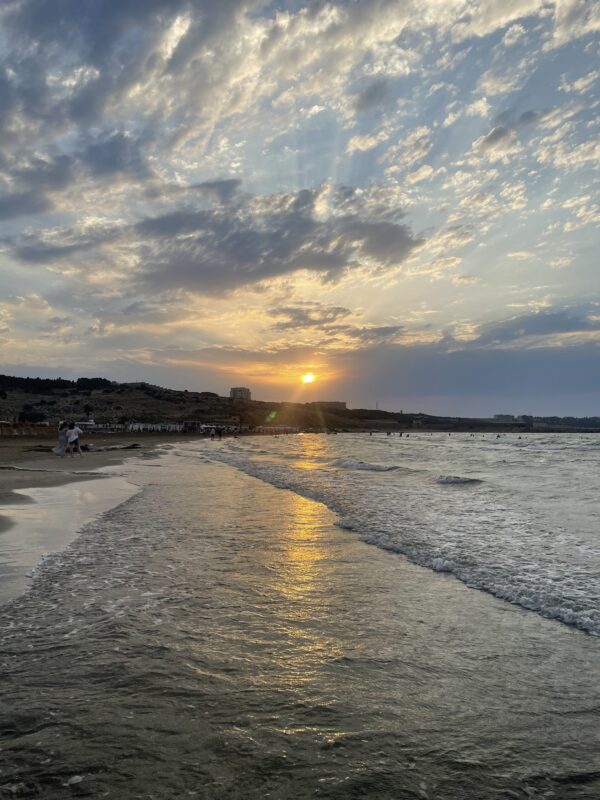
Living deeply
It isn’t about how long you have to live; it is about how deep you are living it.
When I went to Tehran this time, to find a few delightful tools such as various leather and metal pencil cases, colorful pens, and similar writing accessories, I carved a narrow and difficult path through the heaps of items piled up in my study room, which had more aptly become a storage room than a study, to reach my writing desk. I bought the writing desk with excitement after receiving my first internship salary as a judicial trainee from Hassan Abad Square in Tehran. The first thing that caught my attention was half a sheet of a calendar page showing the date Sunday, March 8, 2015. I had written the above sentences on the paper and stuck it on the front of my desk. It was my usual habit to write down sentences I occasionally saw or heard in different places and times on pieces of paper and stick them to my desk, hoping to prolong the pleasant feeling or the moment of enlightenment I experienced when encountering those sentences. That day, when I saw this note again after years, I was certain that although the dazzling light that ignited within me at the moment of the initial encounter is not as intense today, the effect of its steady yet balanced radiance over the years on me is still tangible and even visible to me.
The path of growth is a one-way journey. Polishing the soul and exposing oneself to life and everything it reveals to you enhances the depth, quality, and sometimes the speed of this growth and flourishing. My today’s understanding of “living deeply” differs from what it was nine years ago. Undoubtedly, back then, I perceived a meaning in these phrases that wasn’t as clear and vivid as it is today, and I am confident that years from now, the depth of my understanding of “living deeply” will not be the same as it is today.
But what prompted me to write about this sentence is understanding the relationship between “living deeply” and “living long.” Is the relationship between these two directly proportional or inverse? Without a doubt, to answer this question, we first need to define what “living deeply” entails and what qualities it encompasses. What I have come to understand today about the essence of “living deeply” does not necessarily lead to a long life. How many individuals with deep lives faced the heavy burden of societal disapproval, seeking to eliminate them for the sake of their peace of mind, opting for a superficial and impoverished life? And how many superficial and comfort-seeking individuals experienced nearly a century of life? Countless examples from the lives of my peers or from the annals of literature, science, philosophy, and art validate this idea to such an extent that it inclines me even more towards accepting an inverse relationship between “living deeply” and “living long.”
But I don’t know why I’m not satisfied with this conclusion. I’m unsure if this dissatisfaction stems from the brain’s constant habit of seeking a tidy ending for every story and topic, or if there truly is a flaw in this inductive reasoning. My question in this method of reasoning is about the validity of the general rule and law extracted by each individual from examining various examples (of course, within the limits of their knowledge, experience, and reasoning) throughout their life. However, in the subject under discussion, perhaps with a bit more exploration, we may find other examples where individuals lived deeply while also enjoying a long and fruitful life for their contemporary society and future generations.
Ultimately, regardless of whether the number of individuals in history who lived deeply and long was greater or lesser, the existence of even one example of a person who lived deeply and long is sufficient to challenge the rule of an inverse relationship between these two. But the more challenging issue is verifying the direct relationship between these two. The question is whether focusing on deepening one’s life necessarily leads to a longer lifespan, or whether one must avoid excessive depth in life to have a long lifespan and settle for a superficial level of depth. How can one achieve a long lifespan while living deeply?
My current reasoning and experience suggest that perhaps with a bit of flexibility, understanding, and acceptance in interacting with people and life’s circumstances, one can to some extent reconcile these two aspects.
عمیق زیستن
It isn’t about how long you have to live; it is about how deep you are living it.
این بار که رفتم تهران، برای پیدا کردن چندتایی از ابزارآلات دلخوشکنک، مثل جامدادیهای مختلف چرمی و فلزی و خودکارهای رنگی و این قبیل جینگولجاتهای نوشتاری، در میان انبوهی از وسایلی که در اتاق مطالعهام روی هم تلنبار شدهبود و دیگر نام انباری بر آن صدق میکرد تا اتاق مطالعه، راه باریک و صعبالعبوری باز کردم تا به میز تحریرم برسم. میز تحریری که با ذوق بعد از گرفتن اولین حقوق کارآموزی قضاوت از میدان حسن آباد تهران خریدم. اولین چیزی که توجهم را جلب کرد، نصف کاغذ یک صفحه سررسید بود که تاریخ یکشنبه 9 اسفند 1394 را نشان میداد. روی کاغذ جملات بالا را نوشته و سردر میز چسباندهبودم. عادت همیشگیام بود که روی تکههای کاغذ جملاتی که گاهوبیگاه در مکانها و زمانهای مختلف میدیدم یا میشنیدم را روی برگهای بنویسم و به میز بچسبانم تا شاید آن حس خوشایند یا روشنایی لحظهی مواجهه با آن جمله را برای مدت بیشتری در وجودم تداوم بخشم. آن روز که این نوشته را بعد از سالها دوباره میدیدم، مطمئن شدم که گرچه نور خیرهکنندهای که در لحظه مواجهه اولیه با آن در درونم روشن شد، امروز به آن شدت نیست، اما اثری که تابندگی مداوم ولی متعادل آن طی این سالها بر جانم گذاشتهاست، هنوز برایم ملموس و حتی قابل مشاهده است.
مسیر رشد، مسیری است بیبازگشت. صیقل دادن جان، و خود را در معرض زندگی و هرآنچه بر تو مینمایاند قراردادن، عمق، کیفیت و گاهی سرعت این رشد و بالندگی را بهبود میبخشد. منِ امروز معنای “عمیق زیستن” را به گونهای متفاوت از نه سال پیش فهم میکنم. بیتردید، آن روزها در این عبارات معنایی درک میکردم که برایم به وضوح و روشنی امروز نبود و اطمینان دارم که سالها بعد عمق فهمی که از “عمیق زیستن” مییابم به اندازه امروز نخواهدبود.
اما آنچه من را به نوشتن از این جمله واداشت، فهم رابطه “عمیق زیستن” با “طولانی زیستن” است. نسبت این دو نسبتی مستقیم است یا معکوس؟ بدون شک برای پاسخ به این پرسش باید در آغاز تعریفی از “عمیق زیستن” و اینکه چه کیفیتی دارد، داشتهباشیم. آنچه من، امروز، از کم و کیف “زیستن عمیق” دریافتهام، لزومن به عمر طولانی منجر نمیشود. چه بسیار انسانهایی با زیستی ژرف که جامعه تاب سنگینی وجود آنها را نداشت و در صدد حذفشان برای تداوم آسودگی خیال خود از یک زندگی سطحی و کممایه برآمد. و چه بسیار افرادی سطحینگر و آسایشطلب که عمری قریب به یک قرن را تجربه کردند. نمونههای بیشماری از زندگی اطرافیانم یا تاریخ ادبیات، علم، فلسفه و هنر بر این ایده صحه میگذارند؛ بطوریکه حتی من را به پذیرش رابطه معکوس میان “عمیق زیستن” و “طولانی زیستن” متمایل کردهاست.
اما نمیدانم چرا با این نتیجهگیری راضی نمیشوم. نمیدانم این عدم رضایت به دلیل عادت همیشگی مغز به پایانبندی خوش برای هر داستان و موضوعی است یا حقیقتن ایرادی در این قسم استدلال استقرایی وجود دارد. پرسشم در این شیوه نتیجهگیری این است که قاعده و قانونِ کلیِ استخراجشده توسط هر فرد، از بررسی نمونههای مختلف (البته در حد بضاعت دانشی، تجربی و استدلالیاش) در طول زندگیاش، چقدر قابل اعتبار است. اما در موضوع مورد بحث، شاید با کمی جستجوی بیشتر نمونههای دیگری نیز بیابیم که در عین زیستنی ژرف، عمری طولانی و نیز پرثمر برای جامعه همعصر خود و قرنهای بعد داشتهاند.
در نهایت، فارق از اینکه تعداد کدام دسته از افراد در طول تاریخ بشر بیشتر بوده و کدام کمتر، وجود حتی یک مثال از جمعِ زیست عمیق و طولانی برای برهمزدن قاعدهی رابطه معکوس بین این دو کفایت میکند. اما مسأله دشوارتر احراز رابطه علی میان این دو است. پرسش این است که آیا اساسن تمرکز بر افزایش ژرفای زندگی ضرورتن به عمری طولانی منجر میشود یا برای داشتن عمری طولانی باید از عمیق شدن بیش از حد در زندگی اجتناب کرد و به سطحی از آن اکتفا کرد؟ چگونه میتوان در عین عمیق زیستن، عمری طولانی نیز داشت؟
عقل و تجربه امروز من حدس میزند که شاید با داشتن کمی انعطاف، درک و پذیرش در تعامل با انسانها و پیشامدهای زندگی تا حدی بتوان میان این دو جمع کرد.



